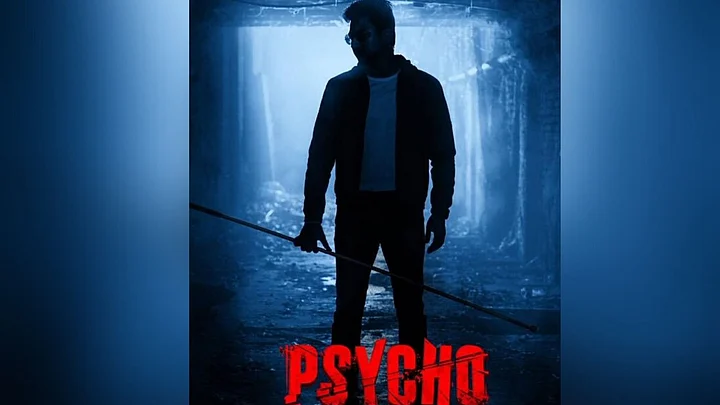Psycho, directed by Mysskin and starring Udhayanidhi Stalin, Aditi Rao Hydari, Nithya Menen, Ram and Shaji Chen is a classic thriller that somehow bundles gore and emotion to make for a riveting story.
With music by Ilayaraaja and Tanvir Mir behind the lens, it’s an A-rated visual treat. Pun intended. Where he truly wins is in the depiction of the psychopath.
To Review or React?
There are two ways to review director Mysskin’s films. One is to hunt for Easter eggs; visual references to world cinema he was influenced by and that he adapted into his story.
Like some of the frames from Psycho, notably the knife plunging into the camera, lights blurred to look like spears. Or the killer’s habit of draining the blood of the victim before ‘presenting’ it for the cops to find. Or how the blind Udhayanidhi Stalin identifies the heroine by the scent of her perfume; scent of a woman. I could go on.
But that would mean missing out on the story he wants to tell. Because there’s Ilayaraja, and his music that has now taken on an aura of nostalgia regardless of the feeling it invoked. And there are faces you’d never expect to see on screen delivering genuine performances with expressions so regional you KNOW the killer and the victim could have been living two streets away.
The Psycho
Ratchasan, 2018’s runaway psycho-thriller was intelligent, gripping and wonderfully layered for a masala film. But the serial killer had OTT idiosyncrasies. So was with other psycho thrillers before it, where it wasn’t hard to find or identify the main villain thanks to the ‘evil’ look and flourishes.
The psycho in this film is calm when he makes the kill. He’s matter-of-fact with no change in body language, whether he’s among people or in his den with a victim. I believe this is a breakthrough in the way a psychopath is portrayed in Indian cinema.
The ‘Angulimala’ Connect
The Buddhist tale goes thus;
Angulimala, a devout student is accused wrongly of having an affair with his teacher’s wife and chased out. He grows bitter and becomes a highway robber who kills needlessly. He meets the Buddha. Moved by his kindness, he understands his folly, and reforms. Yet, unable to forgive himself, he allows the villagers to beat him to death.
The back story of the serial killer is revealed in the second half and draws a direct parallel to this story. There are Buddhist references throughout the film. The hero of the film is Gautaman, named after the Buddha. He is kind, full of love and quick to forgive. Aditi Rao is Dakini, named after the sacred female spirit in Buddhist mythology.
Mysskin-isms
Psycho makes yet another case for considering Mysskin’s films as a separate genre. There are tiny moments strewn throughout the film, that offer glimpses into life’s idiosyncrasies. They have nothing to do with the film, but endear you to the characters, and give you food for thought. You begin thinking of the gory murders in Psycho, and end up smiling at the last shot that is strangely reassuring.
Typically, the characters in Mysskin’s films tend to act the same. The long stares, the clumsy movements and the deep, blank expressions that are too dramatic to feel real outside the screen.
But in Psycho, Mysskin has allowed the actors to evolve as themselves. In doing so, he too has evolved as a director. And this shows not just in the performances, but also in the visual language that is much richer and pleasing to the eyes than before. Literally every frame indoors is a painting. Even the gory ones.
Psycho is worth a watch, and another, even for the faint-hearted. For like all of Mysskin’s films, it hides a ray of sunshine under coagulated blood.
(At The Quint, we question everything. Play an active role in shaping our journalism by becoming a member today.)
